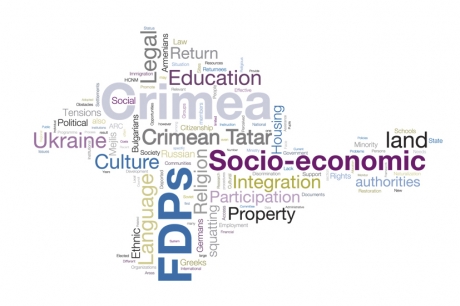Integration of formerly deported people in Crimea, Ukraine, is focus of OSCE High Commissioner on National Minorities’ latest report
OSCE High Commissioner on National Minorities (HCNM) Knut Vollebaek published a needs assessment report on 16 August 2013, entitled The Integration of Formerly Deported People in Crimea, Ukraine. The document seeks to provide an up-to-date analysis of the current situation of national minorities in Crimea and offers recommendations for easing inter-ethnic tensions and increasing the integration of Crimean society, as well as attempts to raise awareness of the issue.

This image was taken from the cover of a report by the OSCE High Commissioner on National Minorities called "The integration of formerly deported people in Crimea.
Since the late 1980s, some 266,000 Crimean Tatars and thousands of other people (Armenians, Bulgarians, Germans and Greeks), who had been deported en masse from Crimea on ethnic grounds by the Soviet regime back in the 1940s, have returned to the region. Given difficult economic and social circumstances, Crimea was not fully prepared to handle such a large and rapid migratory influx. Incidences of hate speech, vandalism of religious sites, violent clashes and widespread unauthorized occupation of land illustrate the depth of social divisions and perceived injustices in Crimea.
“While the Government of Ukraine and the Crimean authorities have made laudable attempts to facilitate repatriation and resolve some of the issues facing the formerly deported people (FDPs), many structural problems remain. Further effort and support, including from the international community, is required to reach a sustainable solution,” Vollebaek notes in the report.
The report is based on research by independent experts commissioned by the HCNM and on the results of Vollebaek’s numerous visits to the region.
In line with the HCNM’s conflict-prevention and early warning mandate, he published this report to raise awareness within the Government of Ukraine and the wider international community, as well as among Crimean authorities, of the main obstacles hindering the full integration and participation of the FDPs. The paper focuses on areas that are subject to competing claims by different groupings on the peninsula and that are particularly relevant to integration. These are the legal aspects of the return process; the situation of FDPs regarding land, housing and property; the political participation of FDPs; socio-economic aspects; the current situation regarding culture, language and religion; and the role of the education system.
Source: Organization for Security and Co-operation in Europe
- 522 reads
Human Rights
Fostering a More Humane World: The 28th Eurasian Economic Summi

Conscience, Hope, and Action: Keys to Global Peace and Sustainability

Ringing FOWPAL’s Peace Bell for the World:Nobel Peace Prize Laureates’ Visions and Actions

Protecting the World’s Cultural Diversity for a Sustainable Future

Puppet Show I International Friendship Day 2020

